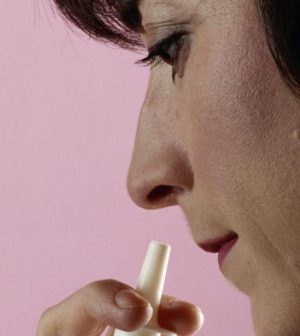- 10 Strategies to Overcome Insomnia
- Could Artificial Sweeteners Be Aging the Brain Faster?
- Techniques for Soothing Your Nervous System
- Does the Water in Your House Smell Funny? Here’s Why
- Can a Daily Dose of Apple Cider Vinegar Actually Aid Weight Loss?
- 6 Health Beverages That Can Actually Spike Your Blood Sugar
- Treatment Options for Social Anxiety Disorder
- Understanding the Connection Between Anxiety and Depression
- How Daily Prunes Can Influence Cholesterol and Inflammation
- When to Take B12 for Better Absorption and Energy
Saline Spray Could Slow COVID’s Spread in the Lungs: Study

A saltwater solution may help stop the SARS-CoV-2 virus in its tracks, Brazilian researchers report.
However, although saline may keep the virus from replicating, it does not offer full protection against infection or a cure for COVID-19.
“It’s not a single solution, and it would have to be used in the first few days after infection,” said researcher Cristiane Guzzo, a professor of microbiology at the University of São Paulo’s Biomedical Sciences Institute.
In the study, a saline solution of sodium chloride at 1.1% reduced replication of the virus by 88% in tests of infected lung cells in the laboratory.
“Reducing viral replication means reducing the severity of the disease and the inflammatory response. COVID-19 is a complex disease, comprising the viral replication stage, which hypertonic saline could treat, and then systemic inflammation, which is far more extensive. This second stage can be intense and lead to a number of complications in different organs,” Guzzo explained in a news release from the São Paulo Research Foundation.
If the strategy proves effective in clinical trials, the researchers said it could lead to the development of new ways to prevent or treat COVID-19.
“Given the gravity of the pandemic, we believe it would be important to extend this line of research by conducting clinical trials designed to verify the efficacy of using a spray … helping to stop the virus from spreading within the infected organism and reducing the likelihood of more severe inflammation,” Guzzo added.
“It’s very simple and cheap,” Guzzo said. “It’s already used prophylactically against other respiratory diseases, and it could minimize the severity of COVID-19 by reducing viral load.”
She suggested that it could be added to safety protocols without replacing the use of face masks, social distancing and vaccination.
“If its efficacy is confirmed in clinical trials, it could reduce viral replication in the nose and throat,” Guzzo said.
The researchers suggest that the saline solution could be tested in two ways. One is a nasal spray like those found in pharmacies. It could be used by front-line health care workers or others highly exposed to the virus.
The other way is inhaling, or nebulizing, saline into the lungs, which is more complicated.
The findings were published online recently in the journal ACS Pharmacology & Translational Science.
More information
The U.S. National Institutes of Health has more about COVID-19.
SOURCE: São Paulo Research Foundation, news release, Sept. 21, 2021
Source: HealthDay
Copyright © 2026 HealthDay. All rights reserved.










